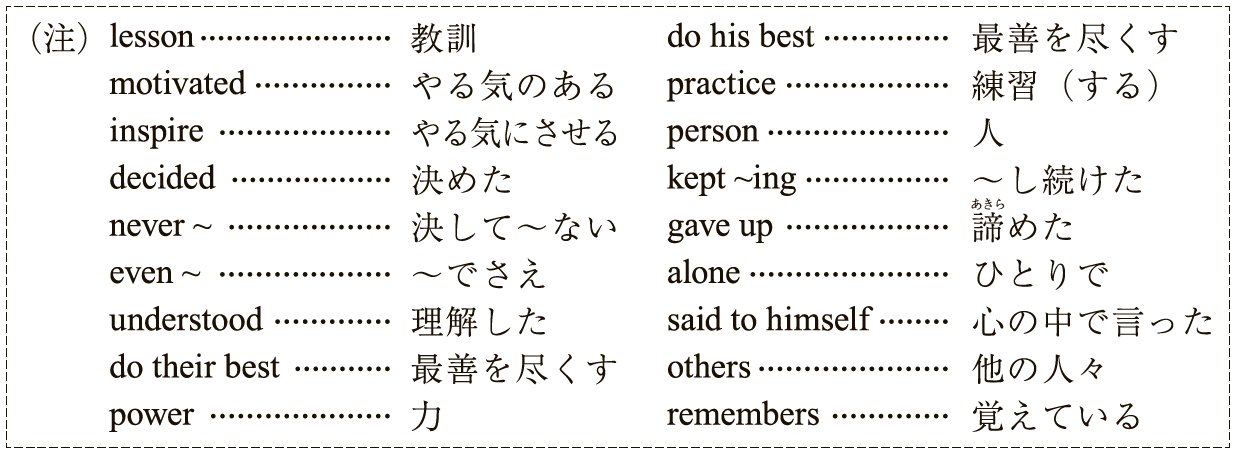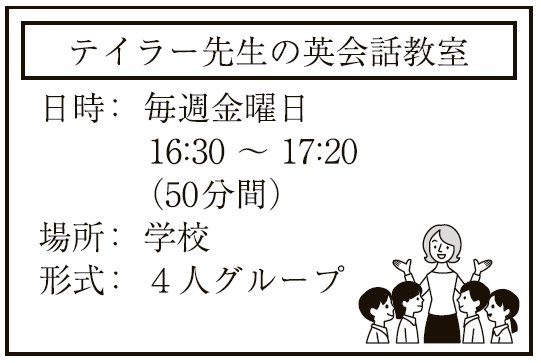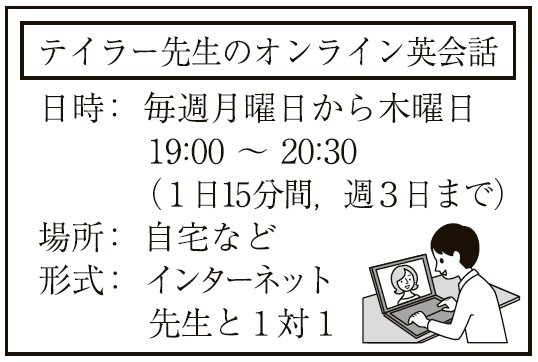令和3年度 学力検査問題
英語筆記テスト
注意
| 1 | 放送の指示にしたがって,開始してください。 |
| 2 | 問題は,1ページから5ページまであります。 |
| 3 | 解答は,全て解答用紙の所定の欄に記入してください。 |
| 4 | 解答用紙の※印の欄には,何も記入しないでください。 |
| 5 | 英語筆記テスト中に,英語リスニングテストを見直して,訂正してもかまいません。 |
| 6 | 監督者の終了の合図で筆記用具を置き,解答面を下に向け,広げて机の上に置いてください。 |
| 7 | 解答用紙だけを提出し,英語リスニングテスト問題用紙と英語筆記テスト問題冊子は持ち帰ってください。 |
1
次の1~3の各組の対話が成り立つように, A ~ D にあてはまる最も適当なものを,それぞれのア~エから一つ選び,記号を書け。
1
| Koji: | I'm sorry. I could not call you last night. |
| Amy: | A |
| Koji: | Well, I had to help my mother because she didn't feel good. |
| Amy: | Oh, really? I hope she is OK. |
A
| ア | Did you call me? |
| イ | Were you busy? |
| ウ | When did you visit me? |
| エ | Where did you help your mother? |
2
| Kanako: | Can I use your umbrella, Mom? |
| Mother: | Where is yours? |
| Kanako: | I could not find it and I have to go to school now. |
| Mother: | B |
| Kanako: | Thank you. I'll try to find mine again when I come home. |
B
| ア | I have to bring yours to work. |
| イ | I can use yours today because you gave it to me. |
| ウ | You can't go to school today. |
| エ | I have two, so you can take this one today. |
3
| Takeshi: | Have you done the homework for next week's science class? |
| Nancy: | Yes. I wrote about cutting too many trees. How about you? |
| Takeshi: | C I'm going to write about waste in the sea. |
| Nancy: | Good idea! It's not good for sea animals. |
| Takeshi: | Right. I want to save them. D I need ideas before the class. |
| Nancy: | Sure. |
(注) waste …… ゴミ
C
| ア | I have no homework for the class. |
| イ | I haven't done it. |
| ウ | I wrote it last week. |
| エ | I will do your homework soon. |
D
| ア | Please talk about some ways to do that with me. |
| イ | Please tell me your ideas in the class. |
| ウ | Please show me the animals after the class. |
| エ | Please ask me about cutting many trees. |
2
次の英文は,咲(Saki)と貴(Takashi)が,知人で来日中のスミス氏(Mr. Smith)と会話をしている場面と,その後に咲がスミス氏に送ったメールの一部である。これらを読んで,後の各問に答えよ。
| Saki: | You started a Japanese cooking class in London, right? |
| Mr. Smith: | Yes. I began to think about this class when I was working as a chef in Fukuoka. Look at this. It is a picture of my class. |
| Takashi: | Oh, “Washoku Cooking Class”, is that the name of your class? ① In London, I think it is ( you / better / to / name / for ) say “Japanese food cooking class”. |
| Mr. Smith: | Well, that name was not enough for me. You know what Washoku means, right? |
| Saki: | Yes, it means traditional Japanese food culture. We learned about it in home economics class. ② There is some special food ( for / is / you / eaten / which ) annual events. |
| Mr. Smith: | Wow, you learned that at school. Many people in London like sushi or tempura, but they don't know a lot about Washoku. |
| Takashi: | Do you think people living in London can learn and enjoy Washoku? |
| Mr. Smith: | |
| Takashi: | I see. I haven't tried to show Washoku to other people before, but now I want to introduce it to the foreign people around us and enjoy it together. |
| Saki: | Good idea! Let's do it! We'll tell you about it later, Mr. Smith. |
Dear Mr. Smith,
Takashi and I talked about osechi with our English teacher, Ms. Brown, to introduce Washoku to her. We thought she could enjoy Washoku more by having some experiences, so [ ]. Her favorite thing was the flower-shaped vegetables because they looked nice and were delicious. She also liked the colors of the food. They showed a beautiful spring in Japan. She said she was happy because this experience taught her more about Japanese culture. We had a very good time together and learned a good way to enjoy foreign cultures.
Saki
問1
英文中の下線部①,②が,会話の内容から考えて意味がとおるように,それぞれ( )内から4語を選び,それらを正しい語順に並べて書け。
問2
英文中の![]() には,次のア~エのいずれかが入る。会話の内容から考えて,最も適当なものを,一つ選び,記号を書け。
には,次のア~エのいずれかが入る。会話の内容から考えて,最も適当なものを,一つ選び,記号を書け。
| ア | Yes, of course. |
| イ | No, I don't think so. |
| ウ | They can't do that. |
| エ | I don't see them. |
問3
英文中の[ ]には,次のア~エのいずれかが入る。会話とメールの内容から考えて,最も適当なものを,一つ選び,記号を書け。
| ア | she talked about the seasons of her country |
| イ | she showed us her favorite food of her country |
| ウ | we made and ate some osechi together |
| エ | we told her about our favorite osechi |
問4
次の質問の答えとして,会話とメールの内容から考えて,最も適当なものを,後のア~エから一つ選び,記号を書け。
What did Saki and Takashi learn?
| ア | They need to know the way to cook foreign food to understand Washoku. |
| イ | People can understand foreign cultures better if they learn about them through experiences. |
| ウ | Foreign people understand Japanese culture well because they like sushi or tempura. |
| エ | Seeing other cultures is the most important thing to the people of London. |
3
次の英文は,信夫(Nobuo)について書かれたものである。これを読んで,後の各問に答えよ。
Nobuo has learned an important lesson about doing his best.
When Nobuo was a junior high school student, he wanted to be an engineer like his father in the future. He knew he had to study harder, but often he was not motivated. He talked about this with Ms. Sato, a teacher of his volleyball club. He said, “I know I have to study hard, but I can't.” Ms. Sato said, “Really? You ① are keen to practice in our club. Why do you enjoy practicing hard?” Nobuo thought and said, “Well, I love volleyball, and I can practice hard because my friend, Takuya, inspires me a lot. He started to play volleyball with us last year. He has practiced very hard to be a better player. When I see him during the practice, he is doing his best, so I can also practice harder.” “I see. You can study in the same way. Find a person who inspires you like Takuya,” she said. Nobuo knew some students were studying at school early in the morning, so he decided to go to school 30 minutes earlier to study with them.
From the next day, Nobuo kept studying before classes every morning. Sometimes he felt tired. When he wanted to stop studying, he looked around him. Other students were studying hard, so he never gave up, and he studied hard. One day, Aya, one of his friends, said, “I'm sleepy today, but I am here to study. Do you know why? You and other students come to school earlier, and all of you are studying hard. ② This inspires me, and I can study hard even when I am alone at home.” He understood her words and felt happy because he was a person like Takuya. He said to himself, “People who are doing their best can give others the power to work hard.”
Now Nobuo still remembers this lesson, and he will never forget it.
問1
次の質問の答えを,6語以上の英語で書け。
What did Nobuo want to be in the future?
問2
下線部①を別の語句で表現する場合,最も適当なものを,次のア~エから一つ選び,記号を書け。
| ア | don't have time to |
| イ | will start to |
| ウ | really want to |
| エ | never try to |
問3
下線部②の具体的な内容を,英文中から探し,日本語で書け。
問4
英文の内容に合っているものを,次のア~カから二つ選び,記号を書け。
| ア | Nobuo asked Ms. Sato about a way to be a better volleyball player. |
| イ | Ms. Sato told Nobuo to stop practicing volleyball to study harder. |
| ウ | Nobuo started to go to school earlier to study with other students. |
| エ | Nobuo was sometimes tired and could not leave home early to study with other students. |
| オ | Aya told Nobuo that she was motivated because Takuya practiced volleyball hard. |
| カ | Nobuo thinks that people can give others the power to work hard when they do their best. |
問5
次の質問にあなたならどう答えるか。4語以上の英語で書け。
How do you study when you are not motivated?




